Homemade Cottage Cheese
Homemade Cottage Cheese is so easy to make using only two natural ingredients! This recipe takes a few days to coagulate milk for processing the milk into cheese, but the result is fantastic! You’ll get a good amount of cottage cheese that is fresh, delicious, healthy, and flavorful!
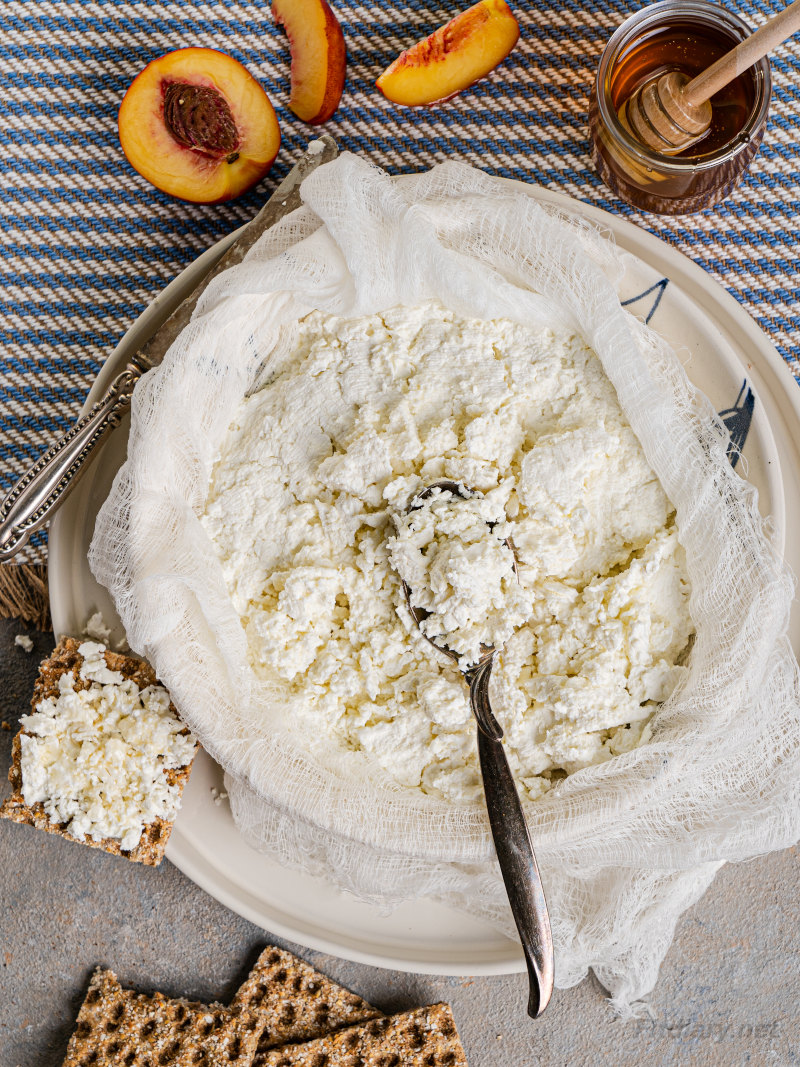
Homemade Cottage Cheese Recipe
Making cottage cheese at home is a very simple process. You need only two wholesome ingredients for Homemade Cottage Cheese – milk and buttermilk. Buttermilk helps to ferment milk faster and always guarantees the best result. Cottage cheese is a soft, tender, and creamy cheese very similar to ricotta but with a tangy flavor.
Cottage Cheese is very popular in Eastern European countries. My mom, who lives in Ukraine, makes cottage cheese only from fresh farmer’s milk all the time. Her cottage cheese is amazing! This recipe is like my mom’s recipe, but along with buttermilk I use store-bought whole milk, 2% milk, or skimmed milk which is lower in fats than fresh farmer’s milk. I end up with the perfect homemade cottage cheese that has a creamy taste and crumbly texture.
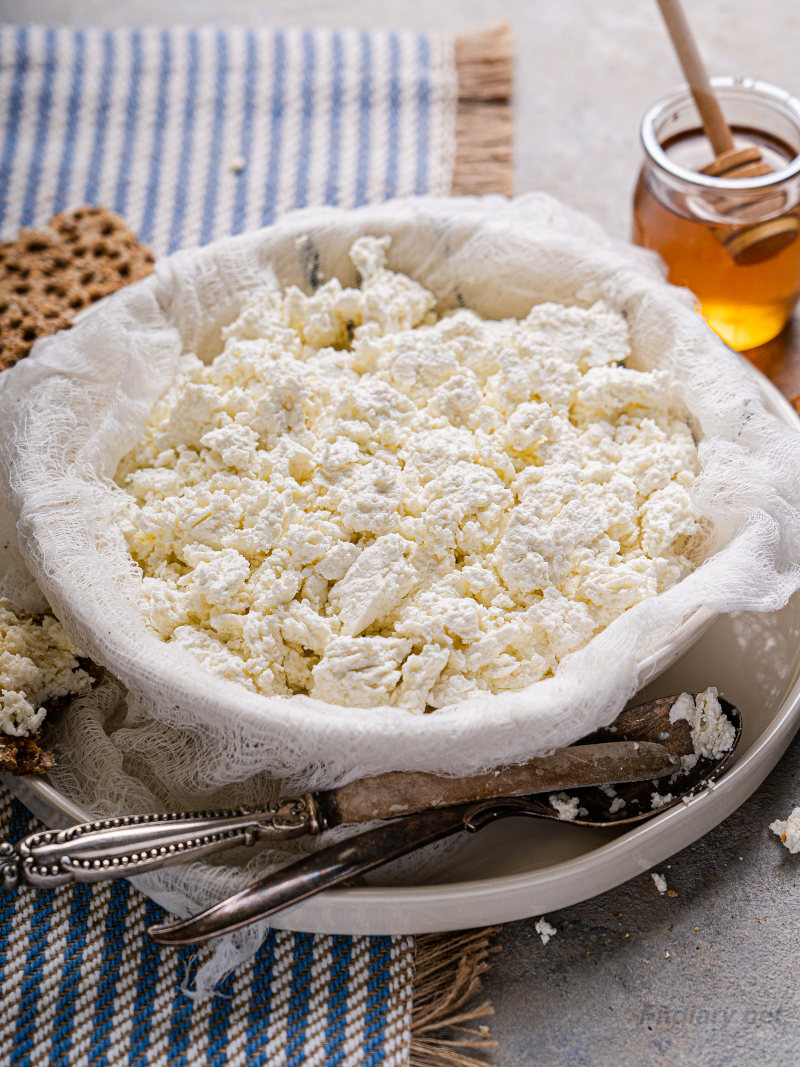
Is Cottage Cheese Healthy and Good for Losing Weight?
- Cottage cheese is high in essential nutrients – is an excellent source of calcium and other nutrients like B vitamins, potassium, phosphorus, folic acid, and selenium. Cottage cheese also contains probiotics that are good for gut health.
- Cottage cheese is considered as diet food – it’s a low-calorie cheese that is high in protein and low in fats. For these reasons, it’s one of the best cheeses for weight loss and great food to add to your diet if you’re looking to lose weight or build muscles.
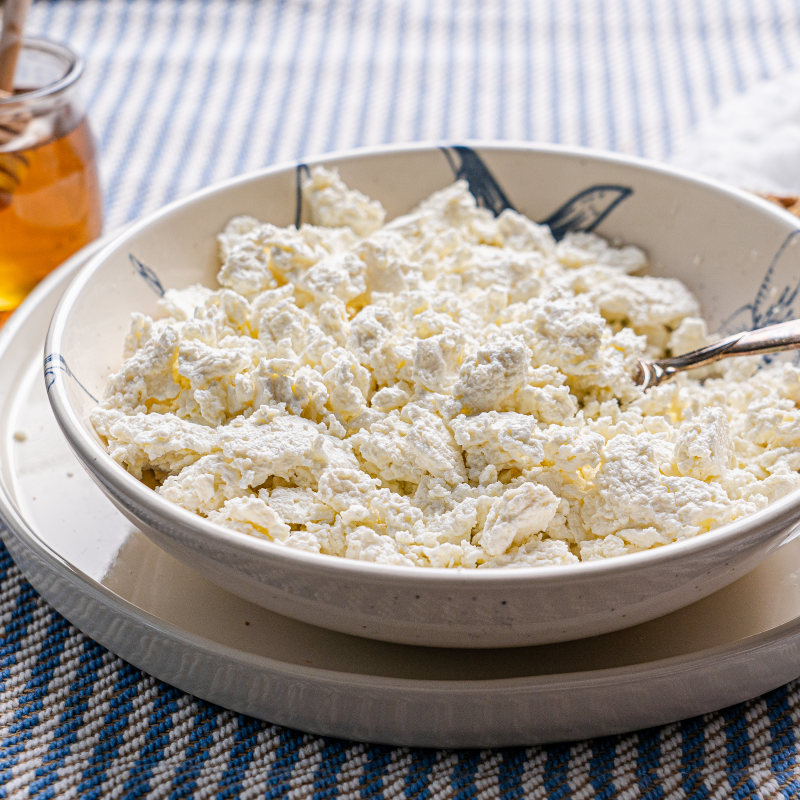
How to Eat Cottage Cheese?
Homemade Cottage Cheese is usually served fresh or used in many recipes. Here are my favorite ways to eat cottage cheese:
Eat cottage cheese for breakfast, snack, or dessert with a topping of fruits, berries, granola and drizzle it all with honey.
Use it on toasts. Cottage cheese is great for making sweet or savory toasts. Mix it with some minced garlic and favorite seasonings or onion powder and chopped fresh dill and enjoy your protein-reach toast spread. For sweet toasts, I like the combination of cottage cheese + fruit jam.
Make the best Cottage Cheese Pancakes. These pancakes are very popular on the blog and very loved by many people. You definitely need to try them!
Make these Crepes with Cottage Cheese Filling. These Crepes make a delicious, healthy, and satisfying treat.
Add it to salads. Substitute feta in your salads for cottage cheese for extra protein with lower fat.
Use Cottage Cheese for making healthy goods. Here are some recipes with cottage cheese:
Ricotta Cheesecake with Blueberry Sauce
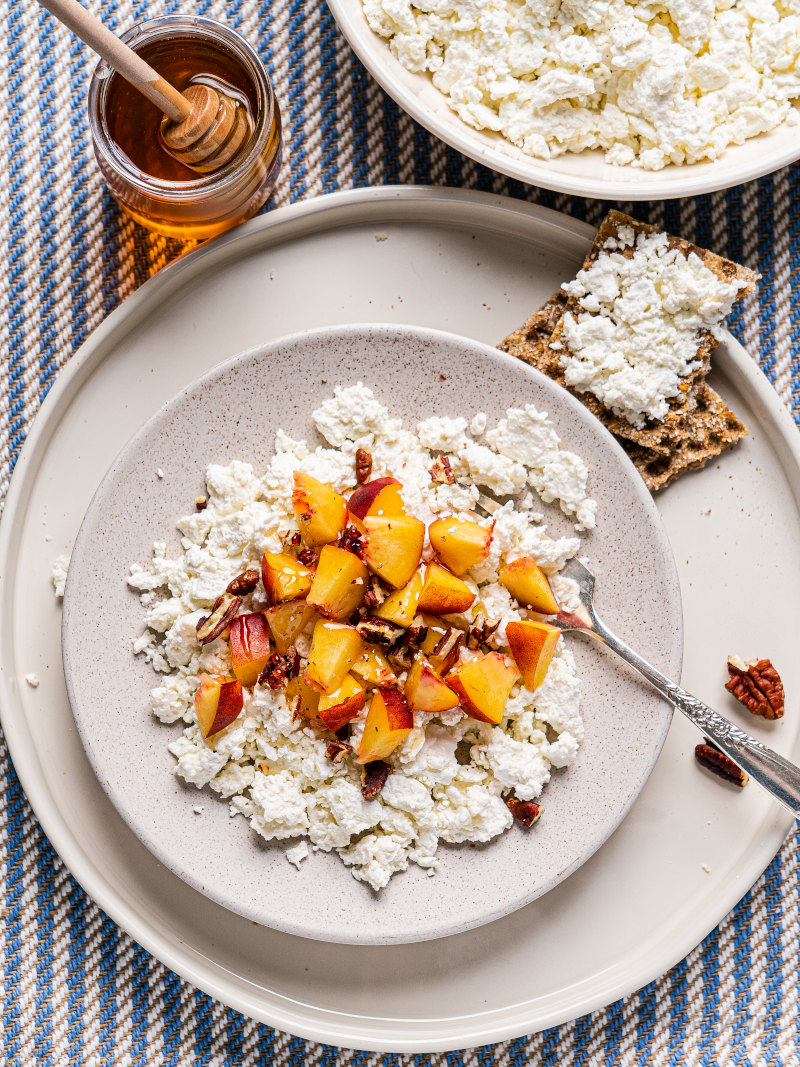
| Serving: | Prep time: | Cook Time: | Total Time: |
| 6 servings | 5 min | 30 min | 35 min |
Ingredients for Homemade Cottage Cheese
- Milk – 1%, 2%, and 3.2% will work great
- Buttermilk – I use 1%
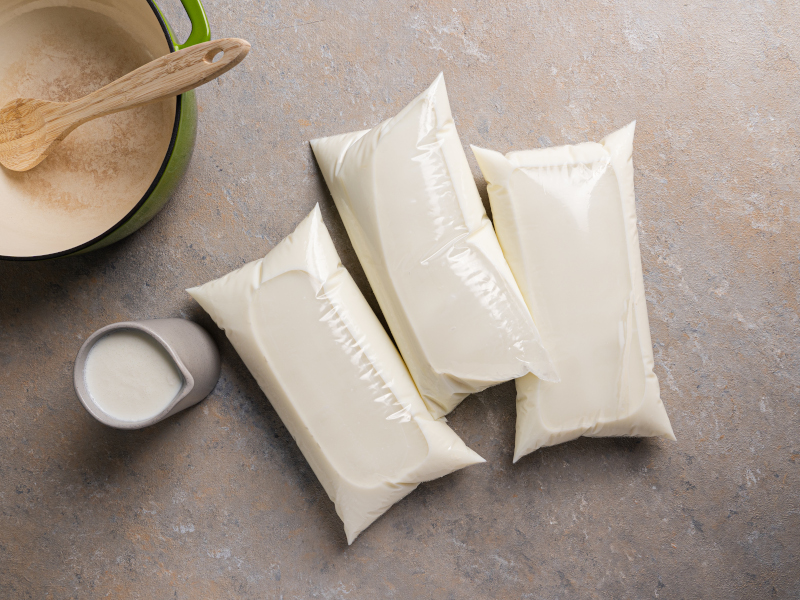
How to Make Cottage Cheese?
- In a large pot (stainless steel or enameled cast iron) whisk together 1 gallon of milk and 2 cups of buttermilk.
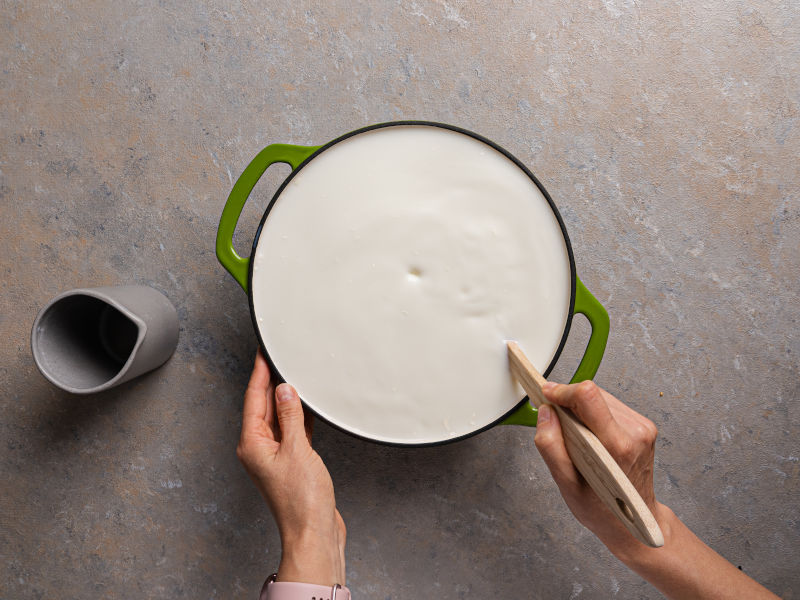
- Cover and let it rest on the countertop to ferment the milk for about 24-36 hours. The curd will be soft and thick like the texture of Greek yogurt.
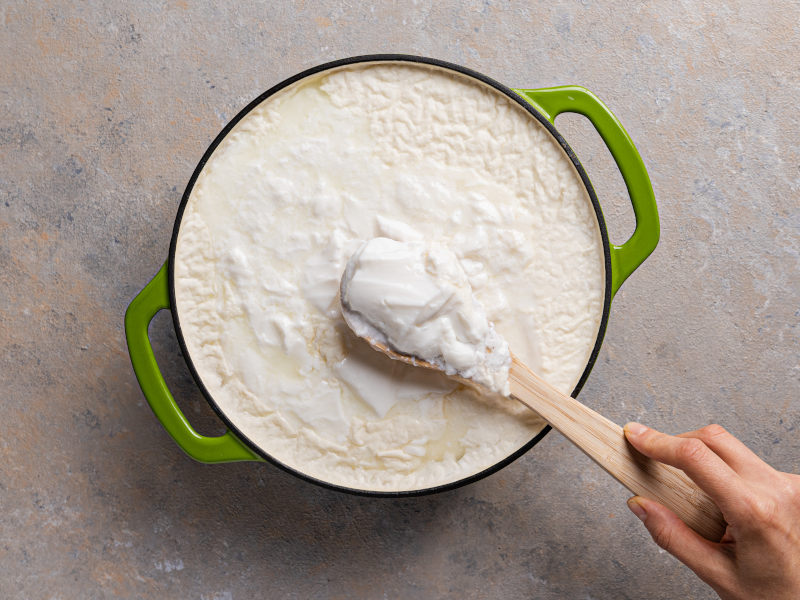
- Optional: If you plan to make cottage cheese on a regular basis, you don’t need to buy buttermilk all the time. Instead, you can use this curd to make your next batch. Set aside 2 cups of the curd and store in an airtight glass container or jar in a refrigerator for up to 10 days. Next time you’re making cottage cheese, use this starter as an alternative to buttermilk. This method with curd starter is good for about 4-batches of cottage cheese. Then you need to use buttermilk again and repeat in the circle.
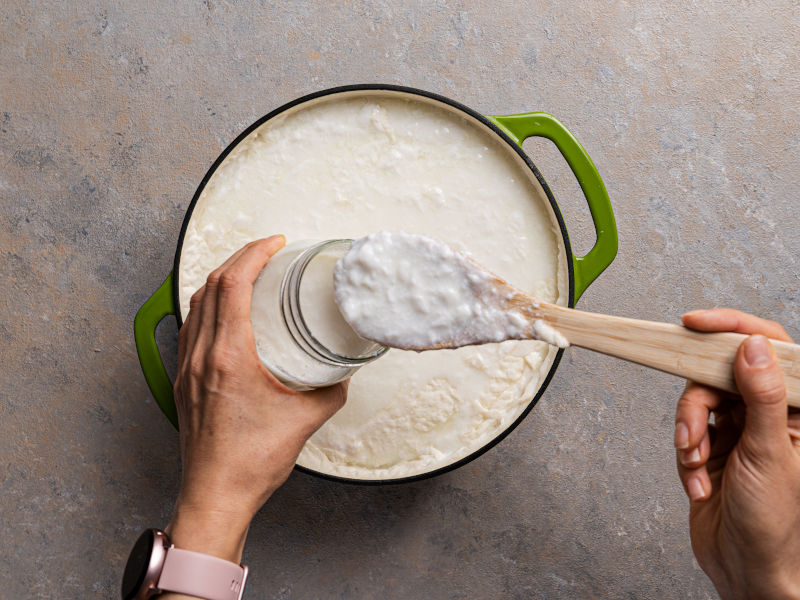
- Place the pot with the curd on the stove and heat on very low heat for 30-40 minutes, gently stirring with a wooden spoon one or two times. The cheese will separate from the whey. Continue to cook until it’s hot or the temperature reaches 150˚F – 170˚F (65˚C – 76˚C). Don’t boil it!
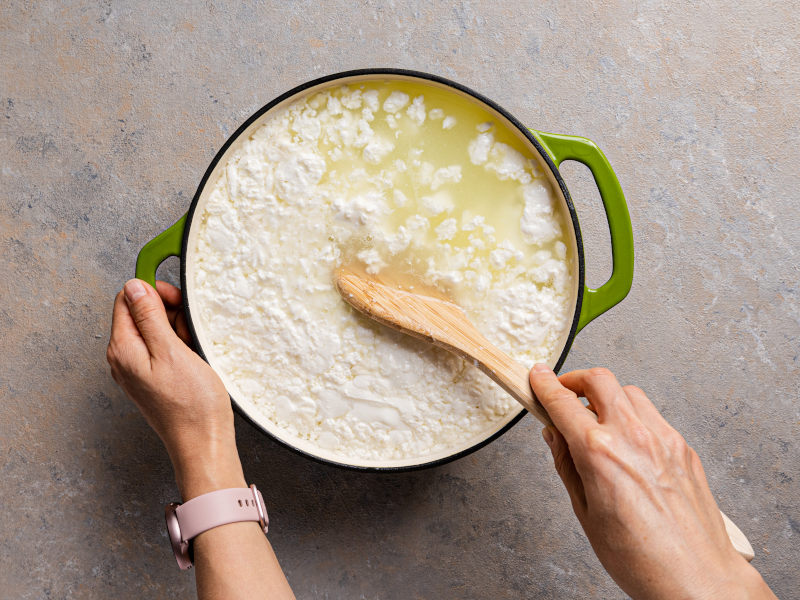
- Place a large colander or fine mesh strainer over a large bowl. Line the colander with a few layers of cheesecloth. Using another small fine mesh strainer or large spoon, transfer all the cheese curds from the pot to the strainer. You can keep the whey (yellowish liquid) and use it instead of water for making bread or just drink it!
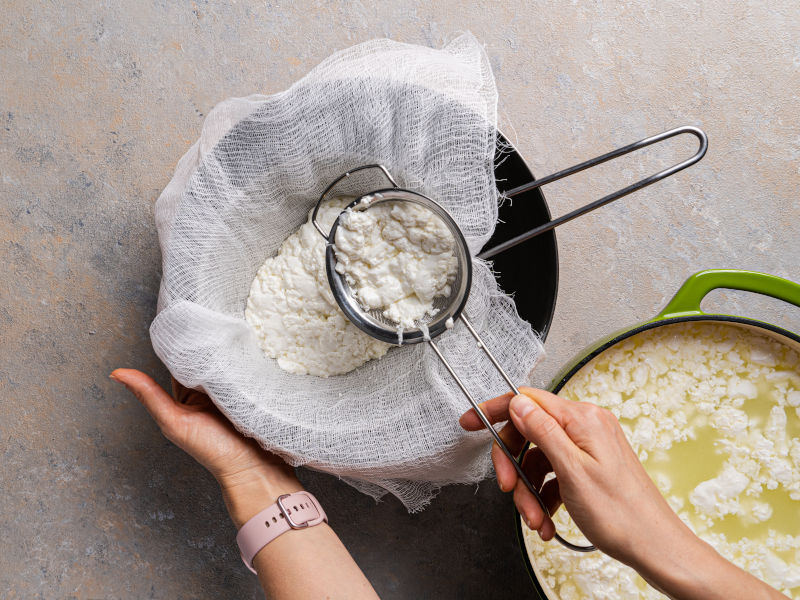
- Fold over the cheesecloth to cover the cheese, place a small plate on top, and put on a can or any weight to press the cheese down. Leave it to drain for about 60 minutes and up to 2 hours.
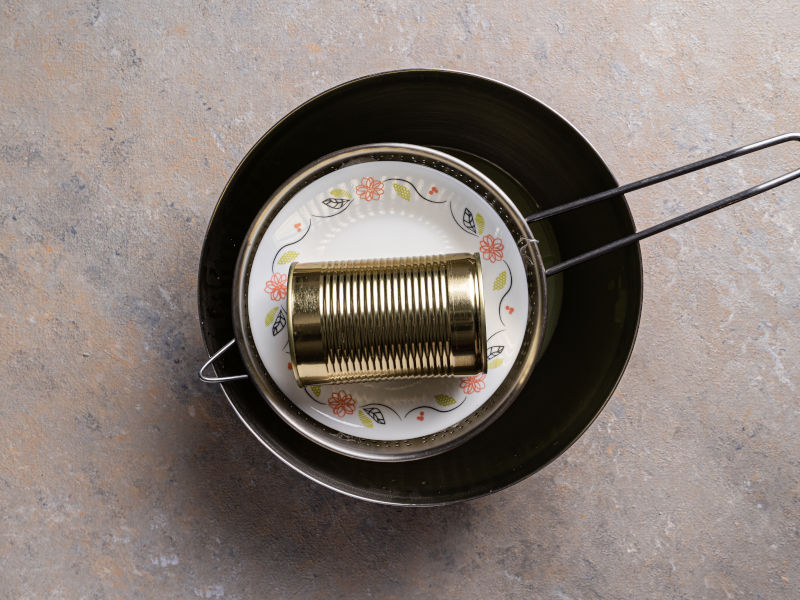
- Unwrap the cheese and enjoy! Store leftover cottage cheese in an airtight container in the fridge for up to one week.
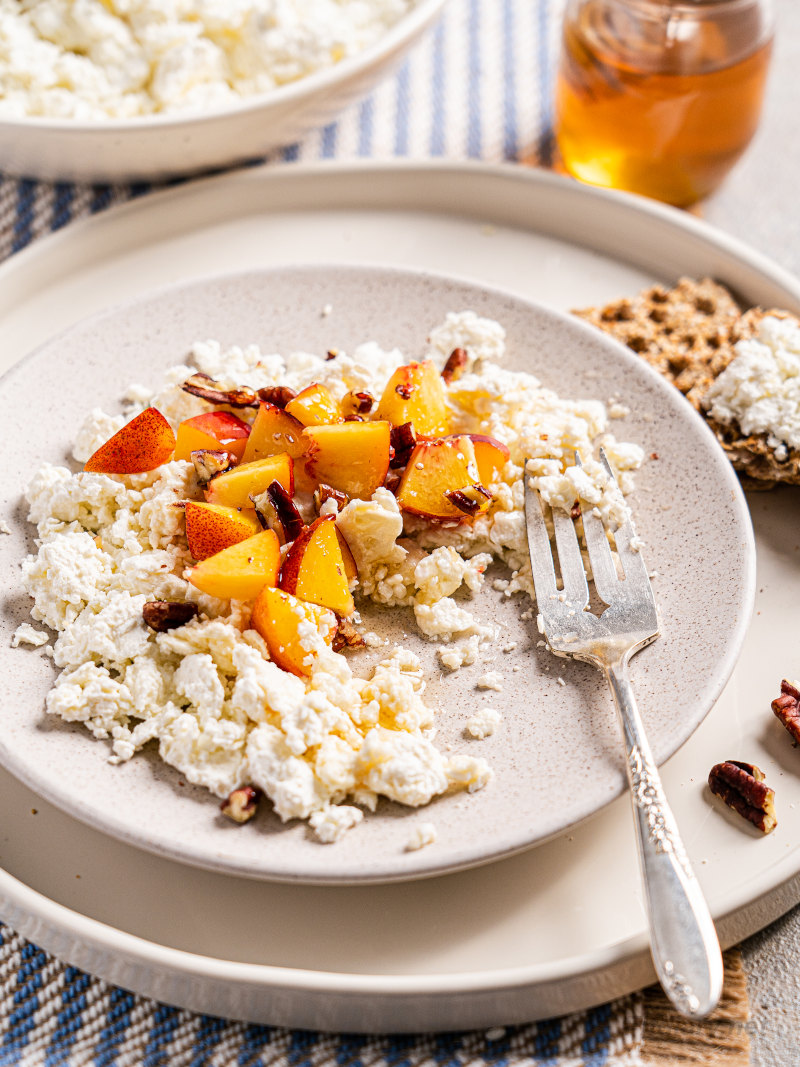
How Many Calories in Cottage Cheese?
| Calories (per 1 serve, 135g): 66 kcal | Calories (per 100g ): 98 kcal |
|---|---|
| Fat: 5.8 g | Fat: 4.3 g |
| Carbohydrates: 4.6 g | Carbohydrates: 3.4 g |
| Protein: 14.9 g | Protein: 11.0 g |
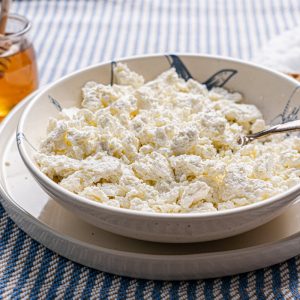
Homemade Cottage Cheese
Ingredients
- 1 gallon or 4 liters milk, 1%, 2% and 3.2% will work
- 2 cups or 470 ml buttermilk
Instructions
- In a large pot (stainless steel or enameled cast iron) whisk together 1 gallon of milk and 2 cups of buttermilk.
- Cover and let it rest on the countertop to ferment the milk for about 24-36 hours. The curd will be soft and thick like the texture of Greek yogurt.
- Optional: If you plan to make cottage cheese on a regular basis, you don’t need to buy buttermilk all the time. Instead, you can use this curd to make your next batch. Set aside 2 cups of the curd and store in an airtight glass container or jar in a refrigerator for up to 10 days. Next time you’re making cottage cheese, use this starter as an alternative to buttermilk. This method with curd starter is good for about 4-batches of cottage cheese. Then you need to use buttermilk again and repeat in the circle.
- Place the pot with the curd on the stove and heat on very low heat for 30-40 minutes, gently stirring with a wooden spoon one or two times. The cheese will separate from the whey. Continue to cook until it’s hot or the temperature reaches 150˚F – 170˚F (65˚C – 76˚C). Don’t boil it!
- Place a large colander or fine mesh strainer over a large bowl. Line the colander with a few layers of cheesecloth. Using another small fine mesh strainer or large spoon, transfer all the cheese curds from the pot to the strainer. You can keep the whey (yellowish liquid) and use it instead of water for making bread or just drink it!
- Fold over the cheesecloth to cover the cheese, place a small plate on top, and put on a can or any weight to press the cheese down. Leave it to drain for about 60 minutes and up to 2 hours.
- Unwrap the cheese and enjoy! Store leftover cottage cheese in an airtight container in the fridge for up to one week.
Notes
| Calories (per 1 serve, 135g): 66 kcal | Calories (per 100g ): 98 kcal |
|---|---|
| Fat: 5.8 g | Fat: 4.3 g |
| Carbohydrates: 4.6 g | Carbohydrates: 3.4 g |
| Protein: 14.9 g | Protein: 11.0 g |
One comment